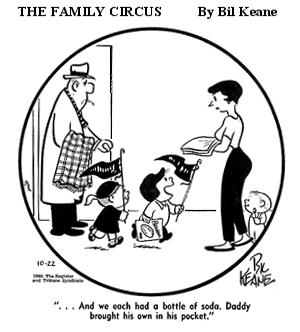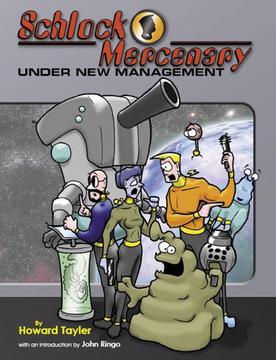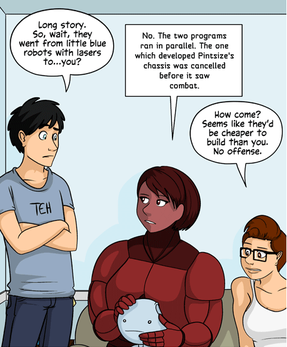
The Family Circus is a syndicated comic strip created by cartoonist Bil Keane and, since Keane's death in 2011, is written, inked and rendered (colored) by his son Jeff Keane. The strip generally uses a single captioned panel with a round border, hence the original name of the series, which was changed following objections from the magazine Family Circle. The series debuted on February 29, 1960 and has been in continuous production ever since. According to publisher King Features Syndicate, it is the most widely syndicated cartoon panel in the world, appearing in 1,500 newspapers. Compilations of Family Circus comic strips have sold more than 13 million copies worldwide.

Schlock Mercenary is a comedic webcomic written and drawn by Howard Tayler. It follows the tribulations of a star-travelling mercenary company in a satiric, mildly dystopian 31st-century space opera setting. After its debut on June 12, 2000, the comic was updated daily until its conclusion in July 24, 2020, supporting its author and receiving five Hugo Award nominations.

Questionable Content is a slice-of-life webcomic written and illustrated by Jeph Jacques. It was launched in August 2003 and reached its 5,000th comic in March 2023. The plot originally centered on Marten Reed, an indie rock fan; his anthropomorphized personal computer Pintsize; and his roommate, Faye Whitaker. However, over time Jacques has added a supporting cast of characters that includes employees of the local coffee shop, neighbors, and androids. QC's storytelling style combines romantic melodrama, situational comedy, and sexual humor, while considering questions of relationships, sexuality, dealing with emotional trauma, and artificial intelligence and futurism.

Christopher Baldwin is an American illustrator and author of several webcomics, the most significant being Bruno, a look at the life of an introspective young woman set in the real world. Other works include shorter webcomic series, some being intentionally designed to attract syndication; these tend to be lighter in tone than Bruno, and include Shepard and May, Kim in Love, and Madge's Diary. Little Dee, about a young girl adopted by a bear, was released on June 7, 2004 for syndication and completed in April 2010. Baldwin later published the science fiction webcomics Spacetrawler and One Way. Aside from comics, Baldwin also wrote the 2003 novel Loved into Submission: a Dark Existential Farce.

Real Life is an American webcomic drawn and authored by Maelyn Dean. It began on November 15, 1999, and is still updated, after breaks from December 10, 2015, to September 10, 2018, and again from July 16, 2019, to June 15, 2020, and most recently, from December 6, 2022 to present. The comic is loosely based around the lives of fictionalized versions of Dean and her friends, including verbatim conversations, as well as fictional aspects including time travel and mecha combat. Characters regularly break the fourth wall. Real Life focuses on humor related to video games and science fiction, and references internet memes.

Mom's Cancer is an autobiographical graphic medicine webcomic by Brian Fies which describes his mother's fight against metastatic lung cancer, as well as his family's reactions to it. Mom's Cancer was the first webcomic to win an Eisner Award, winning in 2005. Its print collection, published in 2006, won a Harvey Award and a Deutscher Jugendliteraturpreis.

Dana Claire Simpson, born David Simpson, is an American cartoonist, best known as the creator of the comic Phoebe and her Unicorn, as well as the long-running webcomic Ozy and Millie. Other works created by Simpson include the political commentary cartoon I Drew This and the alternate reality drama comic Raine Dog.

Jeffrey J. Rowland is the author and artist responsible for Wigu and Overcompensating, two popular webcomics. Originally from Locust Grove, Oklahoma, Rowland now lives in Easthampton, Massachusetts, where he continues to work on the two projects, while running TopatoCo, a company which sells merchandise based on his and other artists' comics.

Brad Guigar is an American cartoonist who is best known for his daily webcomic Greystone Inn and its sequel Evil Inc.
Sheldon is a comedy webcomic created by Dave Kellett. It centers on the odd family unit of 10-year-old Sheldon, his grandfather guardian and his talking duck, Arthur. Much humour is character-based, often joking at traits such as Sheldon's geekiness, Gramp's old age or Arthur's over-inflated ego. Kellett's other webcomic, Drive, had appeared on the Sheldon site each Saturday, before moving to a site of its own.
Little Dee is a webcomic by Christopher Baldwin about a little girl lost in the woods who is befriended by three animals. The animals talk; Dee doesn't.
Helen, Sweetheart of the Internet is a comic strip which was drawn from 1996 through 2005 by American graphics artist Peter Zale. The strip describes a technically adept young woman who works at a technology firm. It was the first comic strip to make the leap from the Internet to newspaper syndication. It began online in 1996 and was syndicated to newspapers by Tribune Media Services beginning on June 5, 2000, and was removed from syndication after December 25, 2005.
Sluggy Freelance is a long-running webcomic written and drawn by Pete Abrams. Starting in 1997, it is one of the oldest successful webcomics, and as of 2012 had hundreds of thousands of readers. Abrams was one of the first comic artists successful enough to make a living from a webcomic.

Ireland Eliesse Baldwin, also known as Ireland Basinger Baldwin, is an American fashion model. Baldwin started modeling and acting in 2013 and appeared in the film Grudge Match and in editorials for magazines such as Grazia. Baldwin is also a vocal advocate for animal rights and posed for PETA 24 years after her mother did.
Notable events of 2007 in webcomics.

Dumbing of Age is a webcomic about college life at Indiana University by cartoonist David Willis with themes involving drama or comedy, occasionally with a mixture of both. The series itself is a reboot reusing characters from Willis' previous comics. While Willis' previous webcomics shared a science-fiction universe, Dumbing of Age is independent of these, reflecting more slice-of-life than the previous works. The comic is generally set in the present day, yet not set in any particular year due to the glacial pacing, current technologies are depicted in-comic anachronistically so the comic is not a period piece. Willis has reported Dumbing of Age to be his most popular webcomic, with a readership that around three times that of Shortpacked!.
Notable events of the late 1990s in webcomics.











